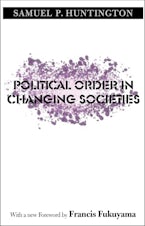

This now-classic examination of the development of viable political institutions in emerging nations is a major and enduring contribution to modern political analysis. In a new Foreword, Francis Fukuyama assesses Huntington’s achievement, examining the context of the book’s original publication as well as its lasting importance.
“This pioneering volume, examining as it does the relation between development and stability, is an interesting and exciting addition to the literature.”—American Political Science Review
“’Must’ reading for all those interested in comparative politics or in the study of development.”—Dankwart A. Rustow, Journal of International Affairs
Samuel P. Huntington, one of America’s most influential political thinkers, is the Albert J. Weatherhead III University Professor at Harvard University and the author of many books including The Clash of Civilizations and the Remaking of World Order and Who Are We?
"This pioneering volume, examining as it does the relation between development and stability, is an interesting and exciting addition to the literature."—American Political Science Review
"'Must' reading for all those interested in comparative politics or in the study of development."—Dankwart A. Rustow, Journal of International Affairs
Named one of the significant books of the last 75 years by Francis Fukuyama in Foreign Affairs
"This book, which first appeared in 1968, was one of the classics of late twentieth-century social science, a work that had enormous influence on the way people thought about development, both in academia and in the policy world. The breadth of knowledge about developing countries, as well as the analytical insight that Political Order brought to bear, was astonishing, and cemented Samuel Huntington's reputation as one of the foremost political scientists of his generation."—Francis Fukuyama, from the Foreword